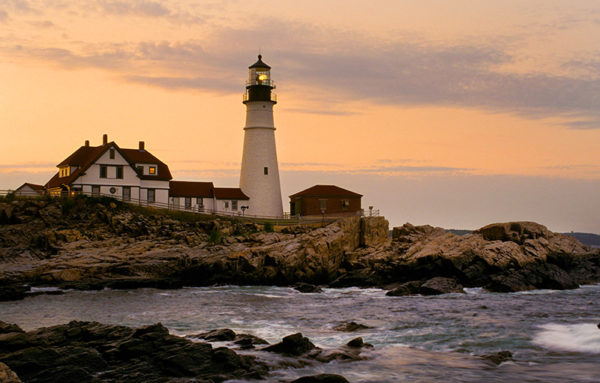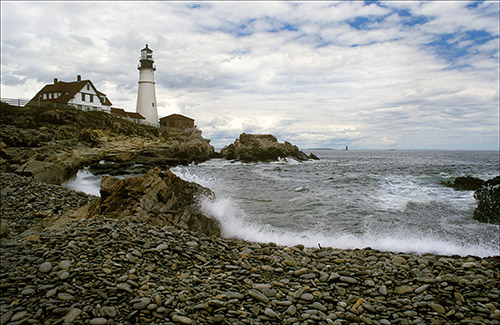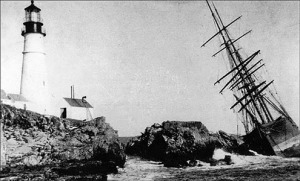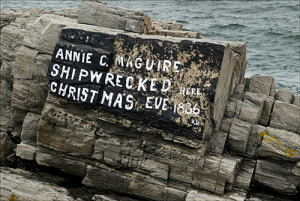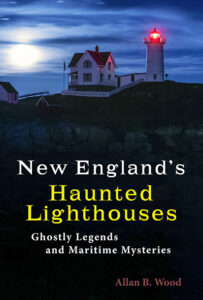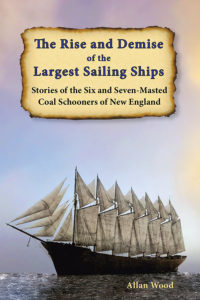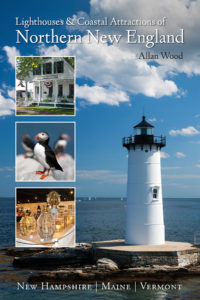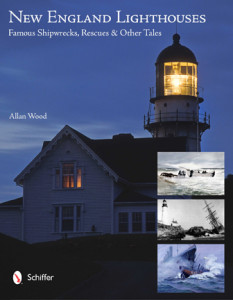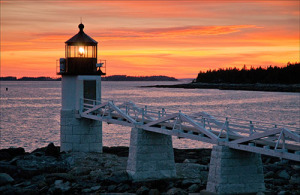Four Generations of the Strout Family at Portland Head Lighthouse in Southern Maine
Portland Head Lighthouse is Maine’s oldest lighthouse, built in 1791 during George Washington’s presidency, and one of the oldest lighthouses in America. Its location atop a rocky cliff on the shoreline marks the picturesque entrance to Maine’s Portland Harbor in Casco Bay. Four shipwrecks occurred near the lighthouse, three a very short distance from the lighthouse, and one a few miles south of the lighthouse near Cape Elizabeth Lighthouse. Two of these, the wreck Annie C. Maguire and the wreck of the Bohemian, are the most well-known and are somewhat intriguing in their stories. After the tragedy of the Bohemian, improvements in the vicinity were made offshore, and the Portland Head Lighthouse tower was eventually raised. Portland Head Lighthouse also has four generations of the Strout family, dedicating over 100 years of combined service to the beacon.
In the 1820s, Joshua Strout’s mother had worked as the teenage housekeeper at Portland Head Lighthouse for an earlier keeper, Captain Joshua Freeman. The joyful keeper so inspired her that she named her son Joshua Freeman Strout when she married years later. Joshua Strout went to sea at the age of eleven, and by the time he was eighteen, he became a cook on a tugboat. He later became a captain of the brig Scotland in 1854, where he sailed and transported cargo around South America. He captained other vessels and enjoyed sailing worldwide, dealing in foreign trade. It was more of a glorious adventure for these men drawn to the ocean than being planted on shore in America in those times. With the excitement of exploration and trade with other countries came many pleasant and often rough times. Some difficult periods included many bad storms, long stretches over open waters where time would seem to stand still, occasional mutinies to deal with when food supplies dwindled or had gone bad, or abusive captains. During California’s gold rush, Strout helped transport many “Forty-Niners” to San Francisco in search of their fortunes.
Sometimes deep-water sailors like Strout were retired to respectful positions onshore due to accidents or, if they were lucky enough to live long enough, of old age. A severe fall from the mast of his ship, Andres, forced Captain Strout ashore, and in 1869, he was made keeper of the Portland Head Lighthouse with the help of his mother. His wife Mary served as assistant keeper for ten years with him until 1877, when their fourth son Joseph, at 21, took over the duties as the new assistant keeper to help his father.
The Strouts loved life at the lighthouse, and Joshua frequently met with the famous poet Henry Wadsworth Longfellow, who lived nearby in Portland. Longfellow would visit the lighthouse a day or two each week, and the two men would enjoy many pleasant conversations together, becoming close friends. Longfellow’s famous poem, “The Lighthouse,” was believed to have been written while sitting on the rocks by Portland Head Light as he was enjoying the beauty that engulfed the region. Like many dedicated lighthouse keepers, Joshua rarely took time away from the light. He is known to have gone nearly 17 years without taking any time off.
Over the years, Joshua and Mary raised 11 children at the lighthouse but had lost three of their sons at sea. During a hurricane on September 8, 1869, Joshua barely escaped death when a fog-warning bell crashed over the cliff below the lighthouse close to him.
Their most famous rescue involves the wreck of the Annie C. Maguire on Christmas Eve in 1886, around 11:30 p.m. The vessel ran aground on the rocks nearly 100 feet from Portland Head Lighthouse. The captain could not see the lighthouse in the heavy rains or possible snow squalls and misjudged his location. The Strouts were preparing to turn in when they heard the crash. They rescued all eighteen people safely while the ship lay wedged on the rocks and remained as gracious as they could while the starving crew ate all their food. Creditors quickly seized the wreck later, but little was found of value. The captain and his wife, released days earlier, got away with stealing any valuables. It was an experience the Strout family would never forget.
When Joshua Strout retired as Maine’s oldest lighthouse keeper in 1904 at 79, his son Joseph, already an assistant keeper, was appointed as the next-generation keeper at Portland Head Lighthouse. He had a joyful reputation like his father and was affectionately called “Cap’n Joe” by the locals and mariners alike. The family also had a parrot named Billy for many years. The parrot learned that when inclement weather was coming, it would shout, “Joe, let’s start the horn. It’s foggy!”
Joshua Strout passed away a few years later at the age of 81. The Strout family, a combination of father and son, were keepers of Portland Head Lighthouse for 59 years from 1869 to 1928. When the assistant keeper position was traditionally promoted to John Strout, Joseph’s son, on his 21st birthday in 1912, he became the third generation Strout to serve in a government position at Portland Head Light.
On his birthday, John Strout decided to paint an inscription to commemorate where years ago the Annie C. Maguire had wrecked on the rocks close to the lighthouse. He had to chip a large portion of the rock away to create a flat surface to paint. After mixing mortar, sand, and some paint, he painted the words “In Memory of the Ship Annie C. Maguire, Wrecked on this Point Christmas Eve, 1886.” He also had a wooden cross on top of the rock. The wooden cross has long since washed away along with the original painting, but the inscription has been periodically renewed and repainted over the years. It has evolved into a more straightforward inscription, “Annie C Maguire, Shipwrecked Here, Christmas Eve 1886,” displayed today for residents and tourists alike.
Along with the Annie C. Maguire, two other vessels wrecked near Portland Head Lighthouse afterward and were almost at the exact location as the Annie C. Maguire. One occurred during a severe winter storm on November 30, 1887, less than a year after the wreck of the Annie C Maguire. The schooner D. W. Hammond, was caught in the blizzard and crashed onto the rocks a short distance from the lighthouse. Joseph Strout and his brother Gilman ran out to the shore, where they could see the wreck. They could get a line out to the captain and his two crewmembers on the vessel and pull them safely to shore before the vessel broke apart.
Many years later, on October 4, 1932, the 72-foot schooner Lochinvar, carrying over 20 tons of fish cargo, was caught in heavy fog near Portland Head Light. It crashed on the rocks by the lighthouse less than 100 feet from where the Annie C Maguire had struck some 46 years before. The cargo was destroyed, but the captain and crew survived the ordeal.
John Strout served at Portland Head Light for a few years as an assistant, then later served at nearby Spring Point Light and then at the Lighthouse Depot in Chelsea, Massachusetts. The Strout family of four generations served a total of 128 years as lighthouse tenders, with over 100 years of combined service between family members, including Joshua’s mother’s tenure as the housekeeper and caretaker at Portland Head Lighthouse. Many family members of different lighthouses would be involved in tending a lighthouse, including wives of keepers or their sons. Still, rarely would there be four generations of family members servicing at the same lighthouse.
Other members of the Strout family served at nearby lighthouses in Maine. Len Strout was the keeper a few miles from Portland Head Light, at Portland Breakwater Light, or Bug Light, from 1866 to 1867. Arthur Strout was an assistant keeper at Halfway Rock Lighthouse in Casco Bay.
The current Strout family, whose ancestors served in the lighthouse, donated items a few years ago. Among the items donated is the original brass lamp used to light the lens in the lantern room of Portland Head Light on Christmas Eve, 1886, the night of the famous wreck of the Annie C. Maguire crashed upon the rocks by the lighthouse.
Exploring Portland Head Lighthouse and Grounds
Portland Head Lighthouse is located inside Fort Williams Park. The huge park has plenty of room to hike around the rocky cliffs along the ocean, picnic, and even go kite flying. The Portland Museum lies inside the old keeper’s house and has plenty of marine and nautical artifacts and information on the lighthouse’s history. The views of the lighthouse from various locations over the rocky cliffs make it one of the most photographed lighthouses on the East Coast. This is a historical location worth exploring. Here are some photos of Portland Head Light.
Enjoy!
Allan Wood
Books to Explore
New England’s Haunted Lighthouses:
Ghostly Legends and Maritime Mysteries
Discover the mysteries of the haunted lighthouses of New England! Uncover ghostly tales of lingering keepers, victims of misfortune or local shipwrecks, lost souls, ghost ships, and more. Many of these accounts begin with actual historical events that later lead to unexplained incidents.
One of the Strout keepers and another keeper still lingers around the lighthouse, even after death. Immerse yourself in the tales associated with these iconic beacons!
The Rise and Demise of the Largest Sailing Ships:
Stories of the Six and Seven-Masted Coal Schooners of New England.
In the early 1900s, New England shipbuilders constructed the world’s largest sailing ships amid social and political reforms. These giants were the ten original six-masted coal schooners and one colossal seven-masted vessel, built to carry massive quantities of coal and building supplies and measured longer than a football field! This book, balanced with plenty of color and vintage images, showcases the historical accounts that followed these mighty ships.
Available also from bookstores in paperback, hardcover, and as an eBook for all devices.

Book – Lighthouses and Coastal Attractions in Southern New England: Connecticut, Rhode Island, Massachusetts
Lighthouses and Coastal Attractions of Southern New England:
Connecticut, Rhode Island, and Massachusetts.
This 300-page book provides memorable human interest stories from each of the 92 lighthouses. You can explore plenty of indoor and outdoor coastal attractions, including whale-watching excursions, lighthouse tours, windjammer sailing tours, parks, museums, and even lighthouses where you can stay overnight. You’ll also find plenty of stories of hauntings around lighthouses.
Lighthouses and Coastal Attractions of Northern New England:
New Hampshire, Maine, and Vermont.
This 300-page book provides memorable human interest stories from each of the 76 lighthouses, like the story of the Strouts. It also describes and provides contact info for plenty of indoor and outdoor coastal attractions and tours. These include whale watching, lighthouse tours, unique parks, museums, and lighthouses where you can stay overnight. There are also stories of haunted lighthouses in these regions.
Over 40 stories, including the story about the Strout family mentioned above in New England Lighthouses: Famous Shipwrecks, Rescues & Other Tales. This image-rich book also contains vintage images provided by the Coast Guard and various organizations and paintings by six famous artists of the Coast Guard.
You can purchase this book and the lighthouse tourism books from the publisher Schiffer Books or in many fine bookstores such as Barnes and Noble.
Copyright © Allan Wood Photography; do not reproduce without permission. All rights reserved.
Join, Learn, and Support The American Lighthouse Foundation
